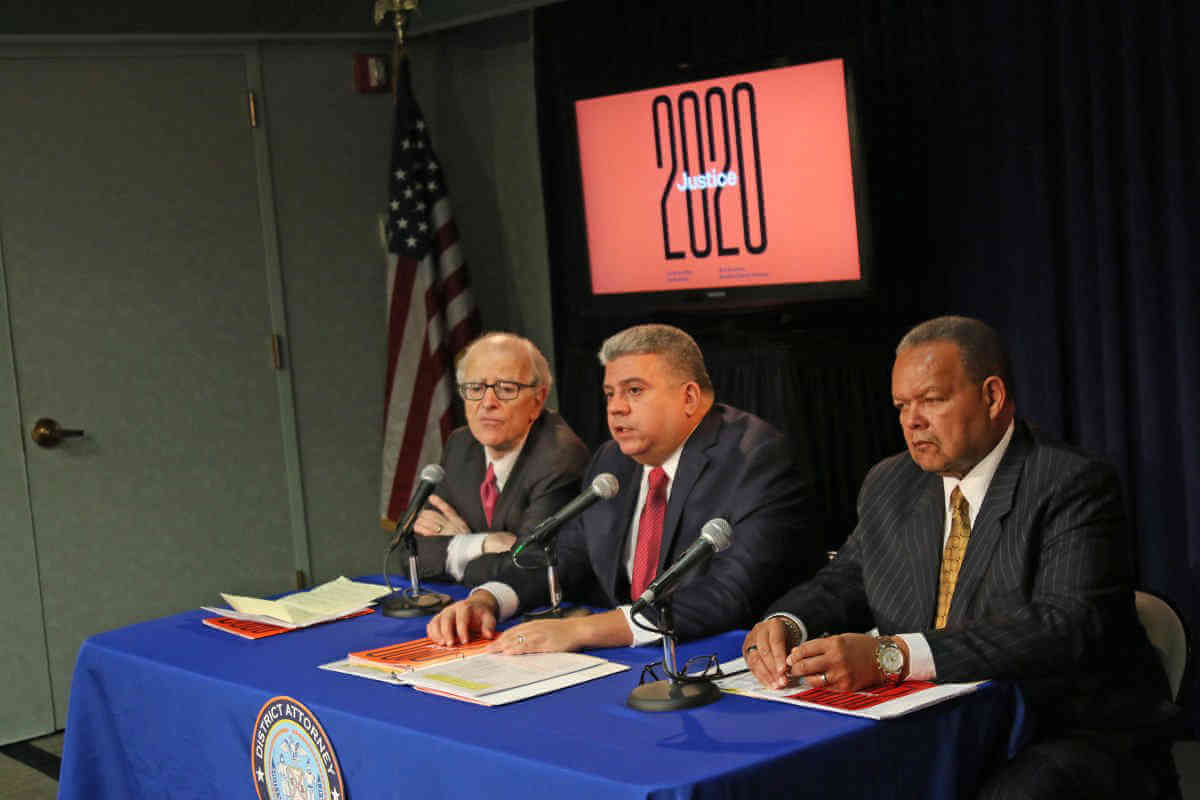Brooklyn District Attorney Eric Gonzalez on Monday announced his plan for a groundbreaking initiative to transform Brooklyn’s justice system into a progressive model designed to keep Brooklyn safe and strengthen community trust by ensuring fairness and equal justice for all.
Gonzalez said the new approaches were developed following months of intensive consultations with dedicated committees made up of, among others, reform experts, defense attorneys, service providers, law enforcement, formerly incarcerated individuals and the clergy and others.
“Justice 2020 is the first program in the nation to take a truly comprehensive and holistic approach to implementing a new model of a progressive and modern prosecutor’s office in the 21st century,” Gonzalez said.
He said among Justice 2020’s key reforms to reduce incarceration and ensure equal justice for all are: Considering non-jail resolutions at every juncture of a case and shifting toward community-based responses to crime; establishing early release as the default position – not the exception – in most parole proceedings; prioritizing collaboration with neighborhood leaders and community-based organizations to provide more diversion opportunities and engage stakeholders as partners; and implementing updated data and analytics systems to drive reform and ensure accountability and transparency.
“Justice 2020 will reshape the Brooklyn District Attorney’s office into a model of progressive prosecution that keeps the public safe and strengthens community trust by ensuring fairness and equal justice for all,” Gonzalez said.
“We will move away from over-reliance on incarceration, engage all stakeholders as partners in justice, focus resources on those who do the most harm and make my office more strategic and mission-driven,” he added.
The Brooklyn DA said he was “deeply grateful to all of the people, many of whom have personal experience within the system – who helped develop this comprehensive blueprint, which we have already begun implementing.
“As we continue to reap the benefits of historic decreases in crime here in Brooklyn and across the country, now is the time to focus on reforming injustices in the system that have led to over-reliance on incarceration and a lack of trust in the criminal justice system,” he said. “In many cases, incarceration does not keep us safer, and I am committed to shifting to ways of holding people accountable and increasing public safety that don’t rely on incarceration as the default option.”
Gonzalez said the panel of experts that led the process to study, create and select these reforms was led by Medgar Evers College President Dr. Rudy Crew and former Chief Judge of the State of New York Jonathan Lippman.
Gonzalez said he plans to make measurable progress towards enacting all 17 recommendations of the Committee by the end of 2020.
“Justice 2020 has the potential to transform the relationship between communities and the criminal justice system,” Dr. Crew said. “At a time when communities lack faith in law enforcement to keep them safe and treat them fairly, Justice 2020 envisions a partnership between the Brooklyn DA’s office and the communities it serves that gives communities a real voice in what safety and justice should look like in their neighborhoods.
“I know of no other DA’s office in the country that is attempting to build bridges with communities in this way, and I commend Brooklyn DA Eric Gonzalez for his leadership,” he added.
Lippman, Launch Committee Co-Chair and current Counsel at Latham & Watkins LLP said, “Justice 2020 isn’t just an agenda – it’s a comprehensive roadmap to improve public safety while diverting those who do not pose a threat to public safety out of the criminal justice system and into community-based services.
“I am honored to be part of the of DA Gonzalez’ Justice 2020 Initiative and hope to see prosecutors’ offices across the country use it as a model for truly progressive criminal justice reform,” he said.
Among the 17 action points are: Change the office culture so that Assistant District Attorneys (ADAs) consider non-jail resolutions at every juncture of a case; offer pre-plea alternatives for all drug possession charges and reduce barriers to participation; seal or expunge past marijuana convictions; consider recommending parole when the minimum sentence is complete and participate more robustly in parole proceedings; and empower community residents and leaders through neighborhood justice partnerships.
Gonzalez said evidence shows that relying on incarceration as the automatic response frequently undermines public safety by breaking apart families and communities and preventing people from pursuing the very educational and employment opportunities that reduce crime and strengthen communities.
























